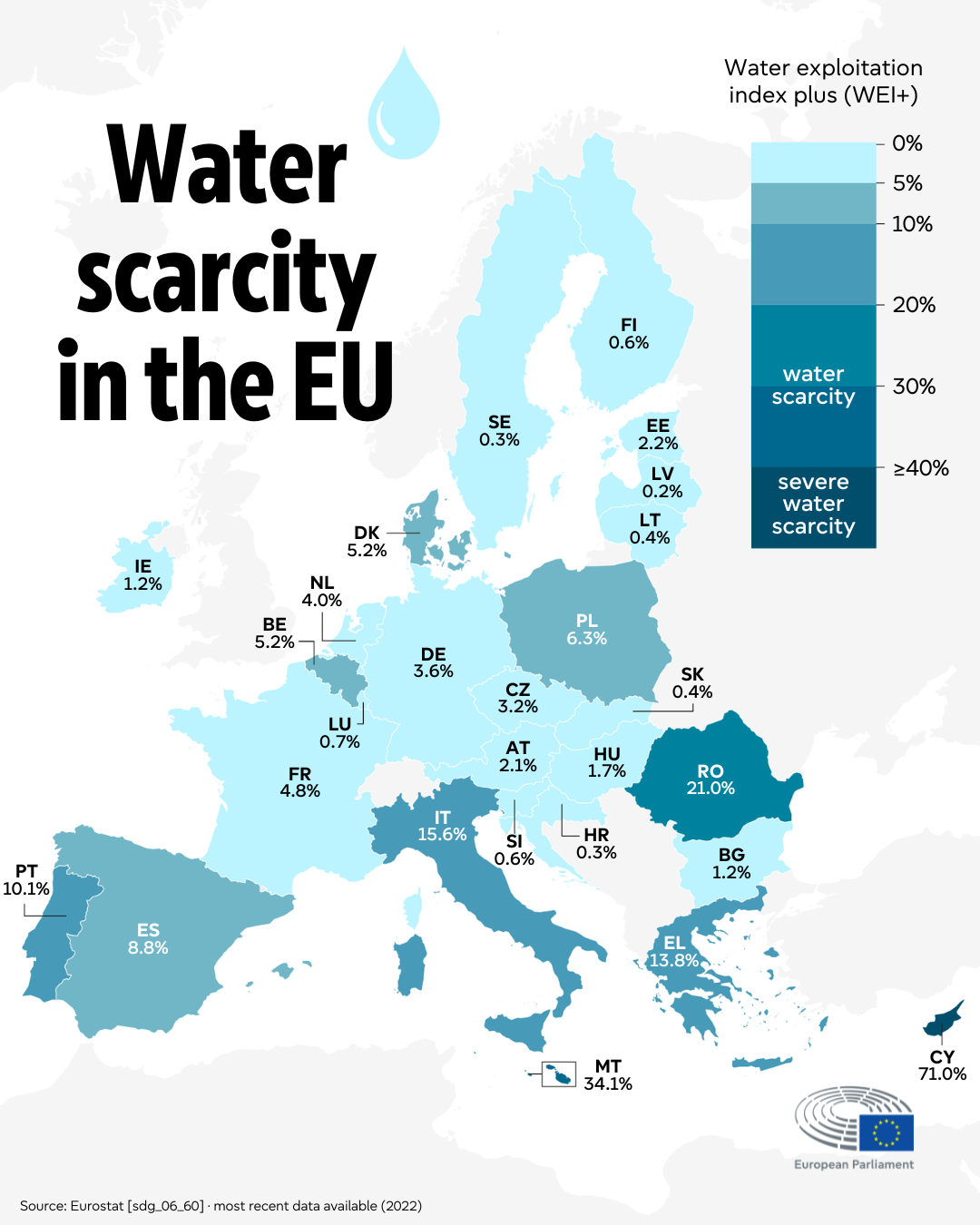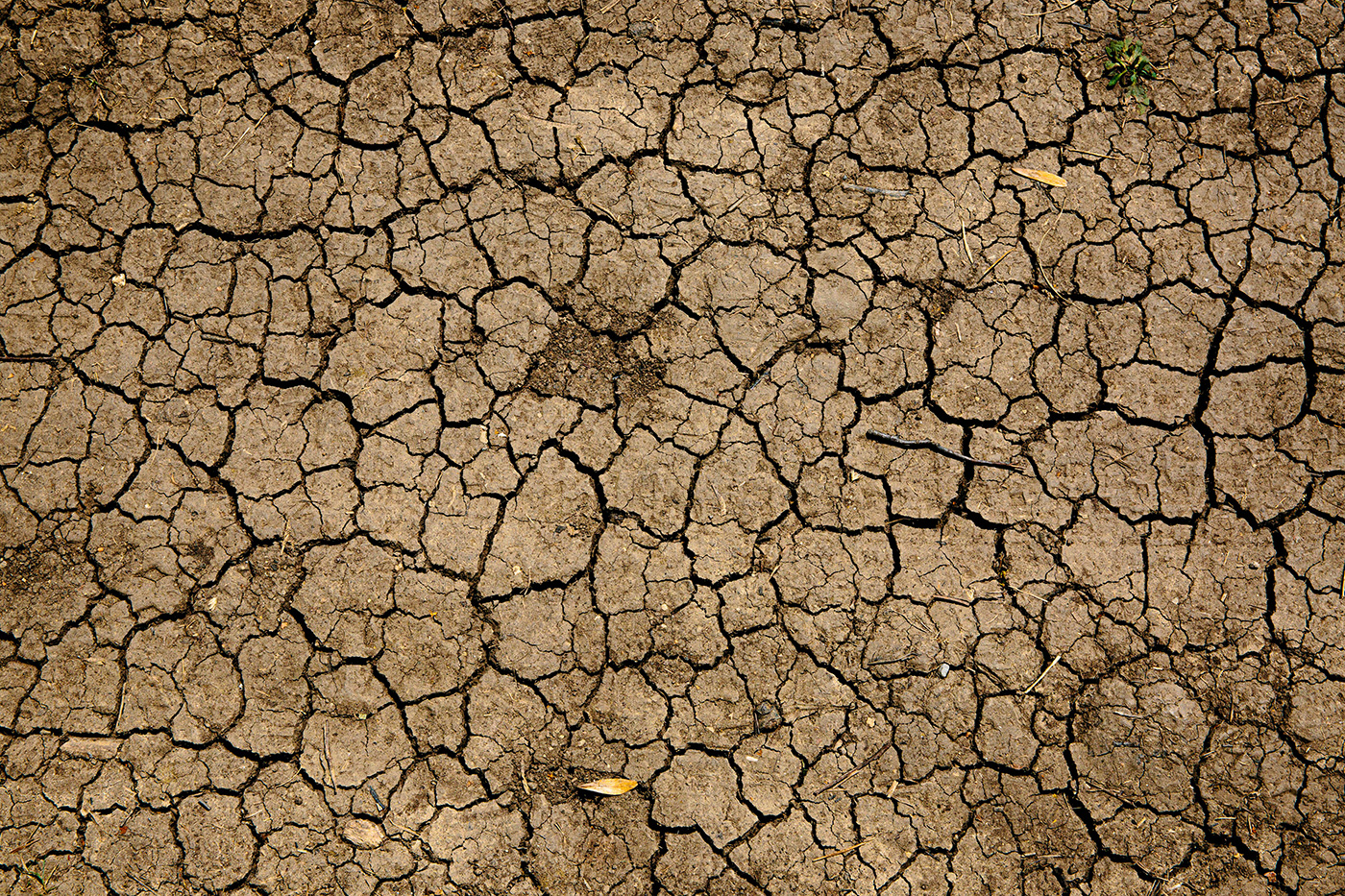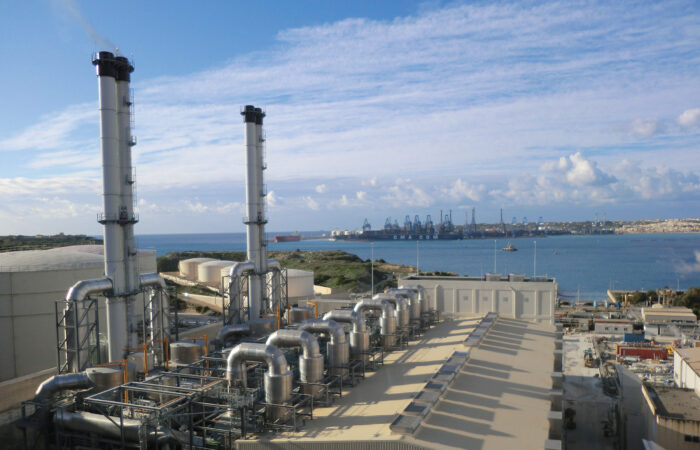Charles Ellinas*
In a report entitled “Europe’s waters: key challenges and EU solutions”, published on 7 May, the European Parliament (EP) draws attention to the key issues concerning Europe’s scarcity, pollution and climate risks.
For Cyprus this is quite timely. Water scarcity has become an extremely serious issue. Recent headlines ranged from “Is Cyprus running out of water?” to “Cyprus faces water cuts this summer”, and a damning “Without water, without a plan”.
The EP report points-out that “Water is an essential resource – not only for public health, the environment and ecosystems, but also for energy production, agriculture and food security,” issues that are central to Cyprus economy and well-being. It has put forward “ambitious proposals and solutions to mitigate these water challenges” that Cyprus will do well to heed and implement.
Based on a ‘Water Exploitation Index Plus’, that measures water consumption as a percentage of renewable freshwater resources for a given territory and period, the report concludes that Cyprus has by far the biggest problems with water availability among all EU countries, followed by Malta and Romania. The Cyprus Water Exploitation Index Plus’ reached 71%, much higher than the accepted threshold of 40% that denotes severe water scarcity.

Furthermore, according to the UN, a country experiences ‘water stress’ when its annual water resources fall below 1700 cubic metres per inhabitant. Based on this, Cyprus is experiencing chronic water stress. According to Eurostat, the long-term annual average freshwater resources of Cyprus are the second lowest in Europe, after Malta, at 400 cubic metres per person per year. The average for Europe is 4000 cubic metres per person per year.
Despite this, according to Eurostat, Cyprus household water use is the second highest in Europe, only just lower than in Greece, at 105 cubic metres per person in 2021, compared to the European median of around 40-50 cubic metres per person. While this has been decreasing in most EU countries during the last decade, it has been increasing in Cyprus. In a recent report the Auditor General commented on “excessive water demand growth of 14.8% between 2019-2023” in Cyprus. Clearly there is plenty of room to improve water use efficiency.
Impact of climate change
Similarly to the rest of Europe, climate change makes water issues in Cyprus worse. Extreme heat and prolonged droughts are here to stay. Around the Mediterranean, and even more so in Cyprus, temperature increases due to climate change and changing weather patterns are much higher than the global average and, if anything, they are projected to increase further with time. These lead to less rain, higher risk of droughts and forest fires and more energy for cooling and water desalination.
Proposed solutions
The EP report suggests “urgent measures to alleviate the impact of droughts, such as higher wastewater reuse, increased water savings in the buildings and industrial sectors and enhanced water efficiency in agriculture” and stresses the importance of water supply security.
There is an urgent need for investments in water infrastructure and management. These include wastewater treatment using advanced treatment processes that enable higher rates of water reuse in both urban and rural areas. New requirements for the safe reuse of treated wastewater in agricultural irrigation are becoming the norm across most of the EU through the “Water Reuse Regulation.” There is also significant potential for circular approaches to water in households.
In Cyprus, in a recent report the Auditor General said that “millions of cubic metres of recycled water are wasted despite drought concerns.” Water that could be used for irrigation. Another major problem is that a very large quantity of water is lost due to obsolete or ageing water networks and the lack of necessary maintenance. The massive water leakage at Mavrokolymbos dam in January brought the problem into focus.
Investment in this, and in improvement and development of resilient innovative irrigation infrastructures, is essential for reducing and improving the quality and efficiency of water consumption in agriculture.
The EP adopted recommendations calling for stronger and more coordinated EU action to address increasing water-related challenges, with a “European Water Resilience Strategy” expected to be presented by the European Commission by this summer. This will “integrate water quality, quantity, security, infrastructure, technology and management aspects.”
Lack of planning
In Cyprus water scarcity reached crisis levels, forcing the government to adopt emergency measures in March to address the worsening water shortage caused by serious drought for the third year running. In fact, “January 2025 registered the lowest level of monthly rainfall for almost three decades.”
This is no longer just a cyclical phenomenon. Since the early 2000s droughts have become quite frequent and more severe, caused by climate change. There are warnings that future “rainfall will never again be sufficient for Cyprus ever-increasing needs… This is not just a bad year that will pass.” As a result, in addition to dams, other measures are essential to solve Cyprus’ water scarcity problem.
So, it is surprising that despite these events and warnings Cyprus, yet again, found itself in crisis situation this year and had to resort to temporary solutions, ending up being rescued by the UAE that provided it with mobile desalination units to alleviate immediate problems.
But the Audit Office has warned that “desalination plants are not a panacea…both existing and planned facilities operate on conventional fuels, resulting in high operational costs and environmental pollution through emissions.” All future plants should make maximum use of renewable energy sources to reduce emissions and energy costs.
Rightly, the Audit Office stressed “the need for a holistic approach to water management, warning that over-reliance on desalination could lead to new economic and environmental problems.”
Lack of long-term planning by successive governments, that takes into account the impact of climate change, appears to afflict all sectors in Cyprus: water, fires, energy, renewables, electricity.
Global warming results in higher temperatures, hotter and longer summers and less precipitation. Coupled with increasing demands from tourism, water scarcity will increase with time. Today’s forecasts and solutions will most certainly be inadequate to cope with future conditions.
Cyprus must and get out of this vicious circle of having to react in the face of emergencies rather than be prepared through long-term planning for what we know will be coming.
*Charles Ellinas is Councillor of the Atlantic Council.




